#Hülk
Explore tagged Tumblr posts
Text
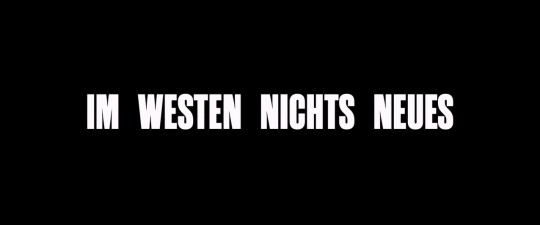





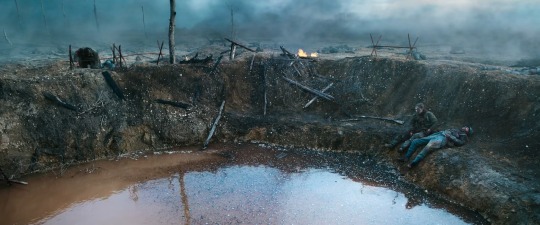


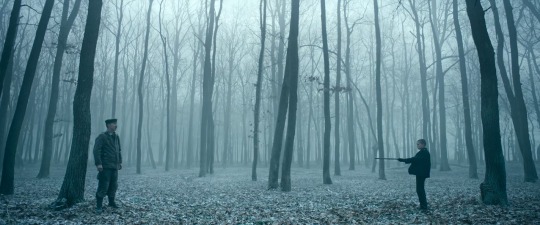
All Quiet on the Western Front (2022)
Director - Edward Berger, Cinematography - James Friend
"What is a soldier without war?"
#scenesandscreens#all quiet on the western front#Im Westen nichts Neues#edward berger#james friend#felix kammerer#albrecht schuch#aaron hilmer#moritz klaus#adrian grünewald#edin hasanovic#daniel brühl#Thibault de Montalembert#devid striesow#Andreas Döhler#sebastian hülk
273 notes
·
View notes
Text
and now i cant even say that a haas has outqualified max verstappen. at least we have a sauber in q3
4 notes
·
View notes
Text

Loving the Hülkenberg train – Haas holding up the grid is my favourite trope of race situation
3 notes
·
View notes
Text
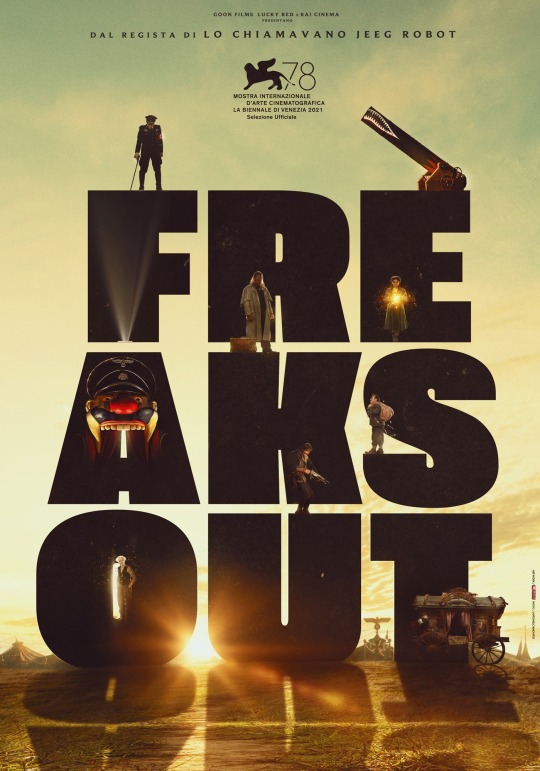
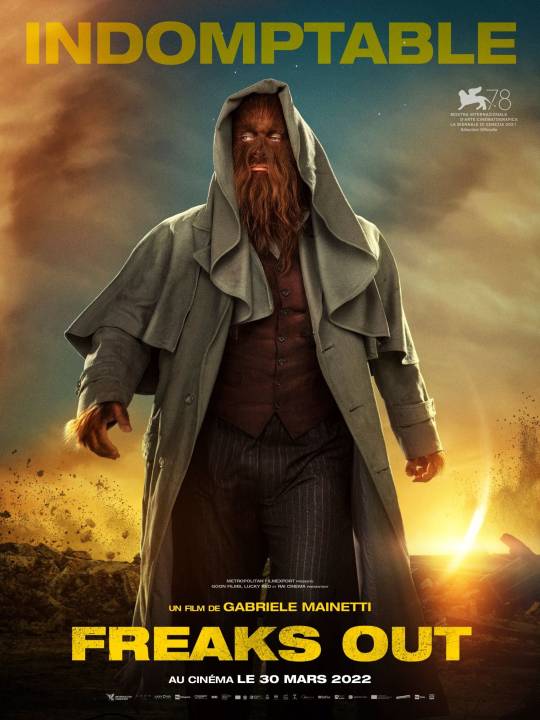

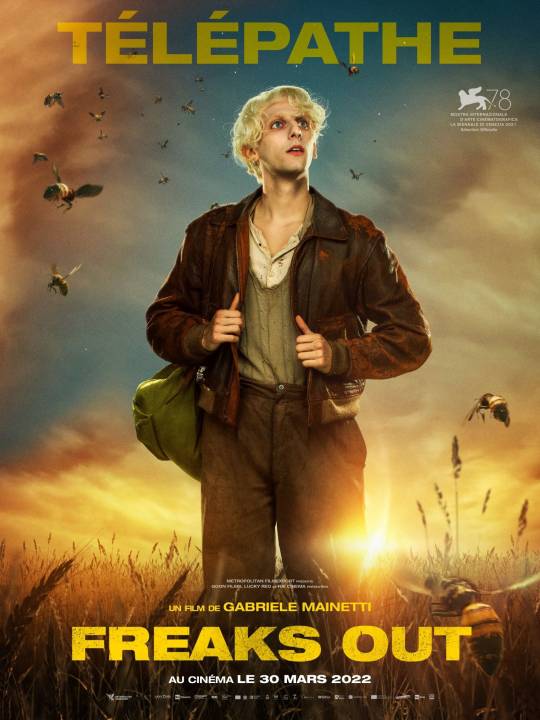
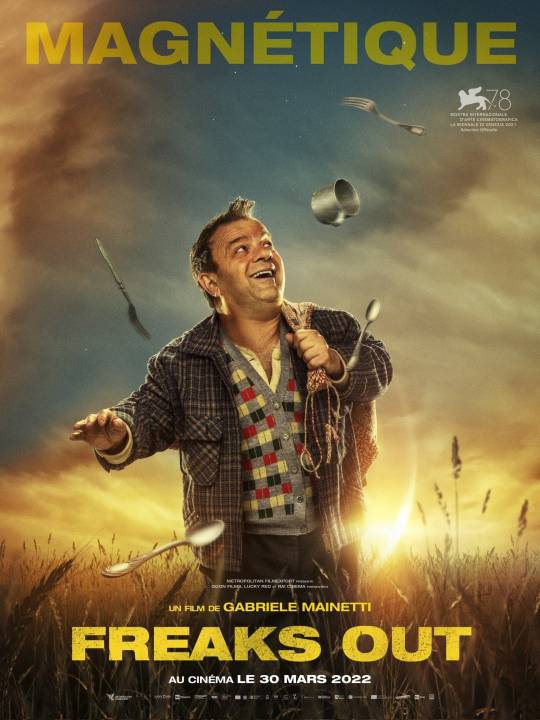


Freaks Out by Gabriele Mainetti (2021)
#movie#freaks out#gabriele mainetti#Aurora Giovinazzo#Pietro Castellitto#franz rogowski#Sebastian Hülk#Claudio Santamaria#Giancarlo Martini#Giorgio Tirabassi#Max Mazzotta#Francesca Anna Bellucci#movie 2021
9 notes
·
View notes
Text
'All Quiet on the Western Lunch' (JK, It's 'Front,' But I Am Hungry)
'All Quiet on the Western Lunch' (JK, It's 'Front,' But I Am Hungry)
How QUIET is it?! (CREDIT: Reiner Bajo/Netflix) Starring: Felix Kammerrer, Albrecht Schuch, Aaron Hilmer, Moritz Klaus, Adrian Grünewald, Edin Hasanovic, Daniel Brühl, Thibault de Montalembert, Devid Striesow, Andreas Döhler, Sebastian Hülk Director: Edward Berger Running Time: 147 Minutes Rating: R Release Date: October 7, 2022 (Theaters)/October 28, 2022 (Netflix) I finally got around to seeing…

View On WordPress
#Aaron Hilmer#Adrian Grünewald#Albrecht Schuch#All Quiet on the Western Front#All Quiet on the Western Front 2022#Andreas Döhler#Daniel Brühl#Devid Striesow#Edin Hasanovic#Edward Berger#Felix Kammerrer#Moritz Klaus#Sebastian Hülk#Thibault de Montalembert
2 notes
·
View notes
Text
All Quiet on the Western Front (2022, dir. Edward Berger) - review by Rookie-Critic
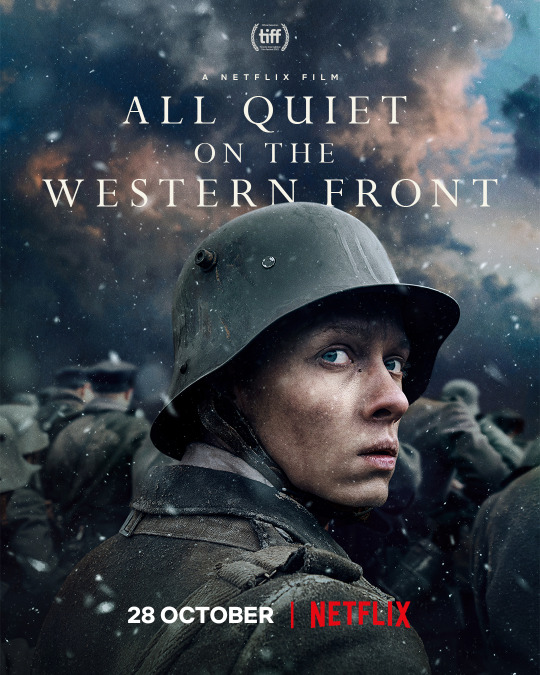
Showing the atrocities of war is always a tightrope walk. You want to show how brutal it is, you want to show people that this thing, this behemoth that has overtaken the world more times than can ever be counted, is horrid and should be avoided if at all possible, but you don't want to desensitize, you don't want to present it so fast, so hard, so unprofoundly nihilistic that it loses its meaning. You don't want to numb people to the pain or push your messaging past its limit, to make the term "war is hell" into a parody of itself. While there were a lot of things I really liked about Netflix and Edward Berger's remake of All Quiet on the Western Front, I feel like this is its biggest issue.
It revels in its "more is more" approach to showing how horrible the Western front lines of the first World War were and it causes the immersion to break and it cheapens the film's very real and very potent anti-war sentiment. The anti-war film is nothing new, we've seen this song dance a million times before, made extremely evident by the fact that this is a remake of the world's first significant anti-war film by the same name, which came out in 1930, 94 years prior to its successor. We've had close to a century of powerful, magnetic, devastating anti-war stories: from Chaplin's The Great Dictator to Kubrick's Paths of Glory AND Full Metal Jacket AND Dr. Strangelove to The Deer Hunter to Apocalypse Now to Das Boot, Platoon, Grave of the Fireflies, 1917, Jojo Rabbit, and on, and on, and on. We get the song, we get the dance, it is a very important message, but we no longer need it spoon-fed to us. The unfortunate thing about the new Western Front is that its images and iconography are intensely powerful and very profound, they get there and they do it fabulously, but then they don't stop. Every scene has an element to it that feels superfluous, that feels like they're bashing your head against the wall that says "war is hell" and screaming at you "DON'T YOU GET IT?!" The answer is, yes, I do, I got it, and I would have without a lot of the, for lack of a better term, extra that's here.
To lay out my point with an example from the film, and don't worry it's not really going to spoil anything (although if you really don't want to know then you should just skip ahead to the next paragraph), but there's a scene in the film involving the general who is in charge of our protagonist's regiment. This immediately follows what is possibly the most intense and brutal sequence in the entire film (which, again, outside of a handful of superfluous elements, is really quite a powerful sequence), and the film juxtaposes all the horror we just witnessed with this general, sitting safely in a very large dining room, eating a feast with a direct subordinate. We get extreme closes ups of everything on the table: olives, fresh bread, a whole leg of lamb, wine, which he drinks a few sips of then tosses the rest on the floor and asks for more. He does this thing with the wine several times throughout the scene. He asks his subordinate about his life back home and what he will return to once the war is over and the subordinate tells him about his family's riding saddle manufacturing/selling business. The subordinate asks the same question to the general and the general goes on a tangent about how he is a soldier who was born in the wrong time because, before this current war, his whole life had been peaceful. He says "what is a soldier without war?" Then tosses what looks like more than half of the meat on his plate to the dog sitting on the floor. This scene would be so infuriatingly impactful and meaningful if the film didn't insist on shoving the message down our throats. I didn't need close ups of the food, I didn't need the spectacle of watching him deliberately waste food and drink, I didn't need this man's hypocrisy slammed into my eyeballs a thousand times over. The atrocious nature of the scenario lies in the scenario itself! Just cut to this horrible man eating his clearly excessive meal in safe quarters after we just watched a lot of men that he is responsible for get brutally mowed down for nothing; no close-ups of the food, no excessive food waste, just the scene itself. Let him talk about how much of a soldier he is. Let this moment be peaceful, that in and of itself would be powerful enough. We, the audience, will get there. We will understand what the film is getting at, it's not that difficult to comprehend, but this is the kind of thing that permeates the entire film.
Here's the thing, I'm still going to give All Quiet on the Western Front a good score, because the truth is I still really liked it. The film has an excellent core. The acting, for the most part, is amazing. The cinematography is unbelievable and the production value is off the charts. Even the story itself, while not really new, is engaging and has a very strong foundation. I just wish it had trusted its audience more and didn't feel the need to just keep adding to itself, to keep piling on more and more until it's just hard to stay engaged. I'm sure this will win a fair amount of Oscars, and it's not entirely undeserving of them, but I don't think it entirely deserves the near-unanimous praise its been getting, because there are a fair amount of problems with it.
Score: 7/10
Currently streaming on Netflix.
#All Quiet on the Western Front#All Quiet on the Western Front 2022#Edward Berger#Felix Kammerer#Albrecht Schuch#Aaron Hilmer#Moritz Klaus#Adrian Grünewald#Edin Hasanovic#Daniel Brühl#Thibault de Montalembert#Devid Striesow#Andreas Döhler#Sebastian Hülk#film review#movie review#2022 films
4 notes
·
View notes
Text
I assume op saw people talk about one or the other and got them confused which happens and I get that but it fucking kills me still
0 notes
Text
The 2024 Azerbaijan Grand Prix

Highlights
1. Lec's Pole Streak
Leclerc leads the race for the fourth time in a row as he qualifies for pole position in Baku once more.
2. Ferraris Lead
We got to see both the Ferraris take turns in leading the Grand Prix.
3. Piastri Overtakes
Piastri takes the lead from Leclerc in Lap 20 onwards, but Leclerc refused to go down without a fight.
4. 4 DNFs
Tsunoda and Stroll collides early on in the Grand Prix which results in both drivers eventually retiring. This is Tsunoda's second DNF in a row. Sainz and Pérez also collide in Lap 50 bringing out yellow flags, they join Tsunoda and Stroll among the drivers who did not finish the race.
5. Best Bear
Ollie Bearman makes history as the first driver to score points in his two first Grand Prix starts.
6. McLaren Leads
McLaren leads the Constructors' Championship for the first time in almost a decade.
7. Williams Scored
Colapinto and Albon both finish with points!
8. From F2 to F1
We got to see an all-F2 champion podium for the first time in F1. Leclerc, Piastri, and Russell all became F2 champions in their rookie years.
Race Recap
The Start
Leclerc leads, Pérez tries to overtake Sainz towards T2 and gains 3rd place.
Verstappen also makes a move on Russell and gets 5th position.
Meanwhile, Albon and Bearman fight for the 9th position. Bearman manages to overtake Albon, but Albon fights back and regains his position.
Norris managed to gain position by Lap 2, now in P12 after starting in P15.
A little farther from the front, Stroll gets a puncture in his car after contact with Tsunoda at the start of the race, causing him to box at the end of Lap 2.
Tsunoda's Problem
It becomes apparent that Tsunoda is having problems with his car as well, caused by the collision with Stroll. He still tries pushing forward but drops behind Norris and Hülkenberg by Lap 3. He continues to drop position by Lap 4 and gets into P16.
At The Back...
Norris takes the last scoring place from Bearman through DRS in T1, Lap 8.
Lance Stroll is now in P20, way at the back and struggling.
Hülk-n-Bear
Hülkenberg overtakes his teammate and is now P11.
A Series of Box, Box!
Colapinto pits at Lap 11, letting other cars pass. He comes back in P15, behind Hamilton.
Alonso pits at Lap 12 and comes back ahead of Colapinto who is in P17. Bearman is back in the points.
Verstappen pits along with Russell in Lap 13. Pérez follows suit, boxes at Lap 14, and comes back behind Norris who's in P5.
Bearman pits in Lap 15 dropping from P8 to P16.
Piastri is next to the pit in Lap 16, Sainz is now in P2 with Leclerc leading still. Norris is instructed to hold Pérez behind so that Piastri could come out of the pits ahead of the Mexican. Piastri comes back behind Albon who’s in P3 and just ahead of Pérez.
Tsunoda DNF
Another DNF for Tsunoda as he must retire at the end of Lap 15. This is his 2nd DNF in a row. Thanks for trying, Yuki. We’ll get it right next time!
Sainz Leads
Leclerc enters the pitlane in Lap 17, Sainz is now in the lead, Leclerc just behind him.
Leclerc Once More
Sainz boxes at Lap 18, Charles leads once more. Sainz exits the pits in P6.
Hang In There, Albono!
Pérez overtakes Albon in Lap 19 for P3.
Piastri Leads
Piastri tries to overtake Leclerc in Lap 20's T1 and succeeds, Leclerc tries to regain his position into T2 and T3 but fails. Piastri now leads the race, with Leclerc chasing him, not giving up until the end.
Smooth Operator
Sainz overtakes Norris into T1 of Lap 23. He gets P5. He overtakes Albon again at Lap 24, gaining 4th place.
Change Your Car...
Verstappen reports problems with his brakes.
Leclerc is still chasing Piastri with a 0.7s gap.
Albo-NOOO
Albon pits in Lap 32, letting many drivers through. He drops into P10 behind his teammate before getting overtaken by Hülkenberg in T3.
Swift Moves, George And Nico
Russell makes a move on Verstappen in Lap 34, takes P6.
Hülkenberg takes 9th position from Colapinto in Lap 36.
Norris Finally Pits
Norris pits for the first time at the end of Lap 37 and comes out behind Verstappen.
Piastri, Stay Calm!
Piastri remains in the lead while Leclerc and Pérez try to take the top spot from him. Meanwhile, Sainz is closing in on Pérez by Lap 46, trying to take that final spot on the podium.
2nd DNF Of The Day
Stroll retires in Lap 47 caused by car problems.
The Red Bulls And Their Problems...
Pérez tries pressuring Charles into giving up P2 but fails.
Norris makes a move on Verstappen and passes him.
Pérez tries to overtake Leclerc again into Lap 50's T1 and succeeds, Leclerc fights back, regains 2nd position while Sainz took 3rd, leaving Pérez in P4. Pérez tries to overtake again but the Red Bull collides with Sainz before reaching T3. This brings out double yellow flags. Pérez and Sainz DNFs.
Piastri’s 2nd Win
A VSC is called by the final lap.
Piastri now leads 10.9s from Leclerc, Russell follows suit.
After much struggle, Oscar Piastri wins for the second time in his F1 career after a solid drive. He managed to overtake Leclerc and kept him behind since then. He wins against the Ferrari this time around, a job well done to car #81!
For more content like this, please follow me on Tumblr as @chequeredandreas. I am also on Instagram and Threads as @chequeredandreas.
#motorsports#formula one#f1#ferrari#journalism#sergio checo pérez#sergio perez#checo perez#carlos sainz#scuderia ferrari#charles leclerc#lando norris#oscar piastri#mclaren#azerbaijan gp 2024#grand prix#mclaren formula 1#ollie bearman#nico hulkenberg#haas f1 team#yuki tsunoda#franco colapinto#alex albon#williams racing
20 notes
·
View notes
Note
Ahhh, I fell asleep yesterday and couldn't finish my ask!
For Ghost Max, Lewis and Max slowly fall in love with each other because of the time and memories they share!
Max's the first to notice his feelings towards Lewis and tries his very best (no matter how strong or weak he feels) to gift Lewis some flowers, either by plucking them himself or by transforming them into ghost flowers, although the transformation takes a lot of energy! Lewis would always appreciate them and get them a vase (the ghost flowers are his favourites though and he's glad they don't die!) to display them.
And Lewis loves to make Max shy or flustered by complimenting him or enjoying his jokes! He wants Max to spend eternity telling him jokes or blushing on his strongest days!
Nico would also be the first one to notice, asking Nicolas (Hülk's full name btw) if he noticed Lewis being happier lately which everyone does! Those with their own ghosts even ask them how Max is and they also answer that Max is the happiest they've ever seen him, and he'd been there for ages!
Oh pls I almost forgot about this verse!!
Max and Lewis being so happy to have the other around and Max realises he fell in love with Lewis which is a little scary but also makes him feel alive! He spends quite a lot of energy on thr ghost flowers and Lewis is worried when he sees Max is a little more transparant than usual! But then Max shows the ghost flowers and Lewis is socin awe of them! Displaying them proudly in a beautiful vase before telling Max to come close so he can recharge a bit, Max laying next to Lewis and the two chatting until Max is solid enough for Lewis to gently brush a kiss to his cheek
Everyone noticing how happy Lewis is and the other ghosts saying Max is so happy too and actually socialising and gushing about how kind Lewis is! They are made foe each otherQ
9 notes
·
View notes
Photo
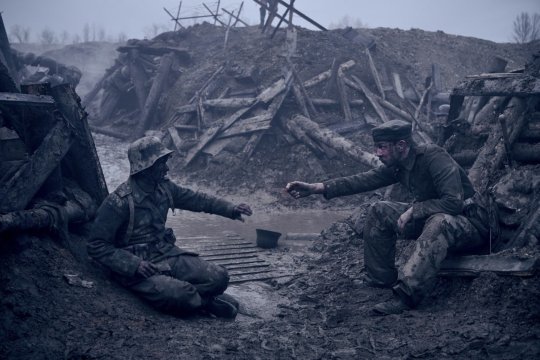
All Quiet on the Western Front (2022, Germany)
As a film buff, I retain a preference to reading a book first before seeing its adaptation. But with how many movies I see in a year – sometimes not realizing that a movie is a literary adaptation before starting it – and given how many original source materials are out-of-print or little-read (let alone how slow a reader I am), this is often too difficult a proposition. I make an attempt, however possible, to learn about the themes of an adapted book I was not able to read before heading into a film write-up. Strict fidelity to the text is not a requirement; yet a film adaptation should adhere to the spirit of the text. Any significant changes to that requires the change be done with artistic intelligence and sensitivity. Especially when the adapted book in question is significant in a peoples’ or a nation’s consciousness. Published in 1929, All Quiet on the Western Front by Erich Maria Remarque is a landmark novel in anti-war literature and remains – for its depiction of World War I on the bodies and minds of the young men sent to fight it – an important part of modern Germany’s sociopolitical identity.
Lewis Milestone’s 1930 film adaptation at Universal with Lew Ayres was the first cinematic masterpiece following the introduction of synchronized sound and the era of the silent film. Now steps in Edward Berger’s German-language adaptation for Netflix, starring Felix Kammerer, in hopes of reminding viewers that Im Westen nichts Neues (roughly “Nothing New in the West”) is, despite its universal appeal, fundamentally a German story. Berger’s All Quiet is a stupendous technical masterpiece – harrowing visual and sound effects, overflowing with blood and mud. It is among the most technically accomplished war movies this side of Saving Private Ryan (1998). Along the way, Berger’s All Quiet tries for too much, and betrays the characterizations and the intent of Remarque’s novel. With some of its violent scenes shot too aesthetically pleasing alongside an offensive and disrespectful electronic score, 2022’s All Quiet casts the French civilians and soldiers as “the enemy” rather than fellow victims. It veers perilously close to fetishizing the violence within.
Before a brief synopsis, it seems appropriate to reproduce Remarque’s epigraph to All Quiet on the Western Front here:
This book is to be neither an accusation nor a confession, and least of all an adventure, for death is not an adventure to those who stand face to face with it. It will try simply to tell of a generation of men who, even though they may have escaped shells, were destroyed by the war.
It is 1917, and the Great War has been plodding along for three years. Along with his friends Ludwig Behm (Adrian Grünewald), Albert Kropp (Aaron Hilmer), and Franz Müller (Koritz Klaus), student Paul Bäumer (Kammerer) enlists in the Imperial German Army. They all receive uniforms that, unbeknownst to them, belonged to German soldiers killed in action. Skipping almost entirely over basic training, Paul and his friends deploy to the Western Front, on the French side of the Belgium/France border. There, they befriend Stanislaus “Kat” Katczinsky (Albrecht Schuch) and Tjaden Stackfleet (Edin Hasanovic), who are several years older and have been fighting since close to the war’s beginning. These young men muddle on in drenched trenches, freezing weather, and their comrades’ horrific deaths. Parallel to the plight of Paul and his fellow soldiers is German politician Matthias Erzberger (Daniel Brühl), who secretly travels by train to the Forest of Compiègne to negotiate with French General Ferdinand Foch (Thibault de Montalembert) an armistice.
Also featuring in this film are Devid Striesow as the so-villainous-he-must-be-a-moustache-twirler General Friedrichs, as well as Andreas Döhler and Sebastian Hülk as two German officers.
This All Quiet on the Western Front occasionally frames its violent scenes as too painterly, the combat infrequently choreographed too closely to action movies (e.g., 2017’s Dunkirk is sometimes more of a suspense movie than it is a war movie and Sam Mendes’ 1917 from 2019 is an aesthetic challenge and action movie first, war film second). The opening moments are a dolly shot that linger over a patchwork of corpses strewn about No Man’s Land, with the dull rattle of machine gun fire occasionally disturbing the soil. There is an almost gawking approach to how cinematographer James Friend hovers over the bodies. One character’s death is shrouded in a blinding angelic light – applying too picturesque a technique for a non-fantastical moment. Some exceptions to this voyeuristic, perhaps fetishistic approach to framing warfare appears, including the frightening emergence of French tanks through a cloud of gas. Berger succeeds in displaying war for all its brutality. The film’s sheen, however, comes off as too aggressive and its camerawork reflecting a Netflix-esque polish.
The most glaring misstep from the screenplay by Berger, Ian Stokell, and Lesley Paterson is to include any perspectives not involving Paul and his most immediate comrades. Depicting the insights of Erzberger, Foch, and the fictional General Friedrichs removes one of the central pillars of why All Quiet on the Western Front was such a revolutionary piece of literature. Remarque’s novel, at a time when “anti-war” narrative art was in its infancy, was one of the first war narratives that concentrated entirely on common soldiers – not the officers that commanded them or the politicians that guided them.
Before focusing on Paul and his friends, let us get the officers and politicians out of the way first. The insertion of the armistice negotiations and Gen. Friedrichs’ beliefs over politicians selling the Germany army out – more on this fiction shortly – stunts Paul and his friends’ respective character growths. And despite a decent performance from Brühl, these scenes (except for the final time the elite appear) play out repetitively: Erzberger pleads to Foch for a ceasefire, Foch demands a conditional surrender that will heavily punish Germany, and Erzberger mulls over the terms of surrender. This is all distracting from the common soldiers’ experiences, and provides as much cinematic or educational value as an amateur historical reenactment.
Berger’s stated justification for including these scenes – and letting them drag on too long in the film’s second half – is reasonable. Over the last decade, the actions of far right political groups in Germany have become more visible. These contemporary groups espouse the myths that some in 1920s and ‘30s Germany used to justify the nation’s actions leading up to World War II – all which monolithized and exploited German WWI trauma to serve repugnant purposes. The emotional imbalance of the Erzberger*/Foch scenes paints France and the Allies as an unforgiving “other”, as well as the war’s eventual “victors” (the Allies did prevail in WWI, but Remarque sees no winners in warfare). For a work never meant to be an accusation and written in between the World Wars, the proto-fascist Gen. Friedrichs spits out an early form of the stab-in-the-back conspiracy theory‡. His behavior and appearance, eerily reminiscent of Allied propaganda of Germans as “the Hun”, casts him as the film’s obvious villain. These decisions all provide Berger’s All Quiet with a juxtaposition of morality more appropriate in a WWII movie than one for the Great War.
Beyond the implications of historical morality, Berger, Stokell, and Paterson’s screenplay undermines, at almost every juncture, Remarque’s critiques of the nationalism that began World War I. The decision to have Paul and his friends join the military in 1917 rather than 1914 (as it is in the book) makes it more difficult to have Paul and his friends to have conversations about the nature and the origins of this war. Instead, the screenplay keeps such dialogue to a minimum. As a result, Berger relies on cinematographer James Friend (in his first motion picture of note) to show us close-ups of Paul’s face to reveal his thoughts. In his film debut, Felix Kammerer is doing all he can with his facial and physical acting, but after a certain point this take on Paul results in him being an empty vessel.
Indeed, in Remarque’s book, Paul Bäumer is very much a reactive rather than proactive character. But that does not mean he is without deep introspection, as he is in this 2022 adaptation. Rather than someone who slowly realizes the nationalistic folly of WWI (“We loved our country as much as they; we went courageously into every action; but also we distinguished the false from true, we had suddenly learned to see.”), muses on how wars begin, and is anything but resigned to war’s inevitability, Kammerer’s Paul emotes and says nothing about these aspects of the war. Any critique from nationalism comes not from Paul in this adaptation, but from Gen. Friedrichs’ cartoonishly villainous behavior and Paul’s teachers in the film’s opening minutes. Paul and his friends are no battlefield geniuses, nor are they intellectuals. But the monotony of war – in the absence and presence of violence – grants them knowledge no classroom can give, wisdom that no elder can impart.
Berger, Stokell, and Paterson have the gall to delete entirely arguably the most critical passage in the book: Paul’s return home after being granted time for rest and recreation. After a lengthy spell fighting in the trenches, Paul’s leave completes his development as a naïve and adventure-seeking student to a detached, disillusioned man. Nationalism manipulates his father and others – mostly older men – into believing the justness of the conflict, that serving one’s country in warfare is glorious.
By contrast, Lewis Milestone’s 1930 adaptation takes Paul’s reunion with his teacher a step further than the book. In that version, instead of a chance encounter at a parade ground, Paul visits his teacher during class, with his newest students a rapt audience. The scene that follows is not subtle. But in the context of Milestone’s adaptation, the film earns it. As Paul, Lew Ayres refuses to gift his former teacher the heroic narrative he requests – paraphrasing Horace, decrying nationalism, and simply stating: “We try not to be killed; sometimes we are. That’s all.” One figures these are the words, delivered in sullen fury, by WWI’s veterans. Berger’s adaptation again leans too heavily on Kammerer to relate any semblance of the above ideas. There is no analogue scene to juxtapose the behavioral and psychological differences between battlefront and homefront, no character or even a faraway figure for Paul to verbally challenge. Kammerer’s Paul does undergo a behavioral and cognitive shift by the conclusion of 2022’s All Quiet. Yet, his transformation is not nearly as dramatic as the narrative needs it to be. These failures all stem from a screenplay that might as well have been titled something else. It is damningly incurious about Paul and his friends.
Major movie studio film scores are moving in a particular direction: amelodic, electronic, experimental, metallic, and minimalistic. It seems, by how awards voting bodies and audiences are reacting to such music, what I am about to write paints me more of an outlier than ever.
Composer Volker Bertelmann (also known as his stage name Hauschka; 2016’s Lion) concocts an anachronistic score that includes all these elements. Devoid entirely of recognizable melody (droning strings), Bertelmann’s score has one repetitive three-note idea – I refuse to call this a motif, as it lacks any sense of development from its first to final appearances – that damages and dominates the movie. Inserted in strangely timed moments and meant to intensify dread, Bertelmann’s idea begins from the root note (B♭), up a minor third (D♭), then descends a minor sixth (F). Bertelmann plays these three notes fortissimo, with synthesizer mimicking blaring brass – trust me, you know the sound and you may know its worst practitioners. When recurring underneath the strings, the idea modulates. Memorable as it may be, this metallic sound is more appropriate for hyping young men before a battle or at a rave rather than suggesting dread. Even worse: this is disruptive music. There is a healthy balance to when music should or should not accompany the imagery onscreen. One should notice music in a movie, and it should empower – but not completely overshadow – the emotions and ideas in respect to a certain scene. Bertelmann’s interruptions appear mostly in calms before the proverbial storms. These are the moments the characters and the audience should collect themselves before the killing restarts. Thus, his three-note idea abuses and instantly overstays its welcome.
Is there a place for such colorless, obnoxious, and offensively manipulative music in film? Certainly. Just not in anything entitled All Quiet on the Western Front.
On its surface, a German-language film adaptation of All Quiet on the Western Front would restore a cultural and linguistic authenticity to Remarque’s text, one of the most important literary works in German history. To some extent, Berger succeeds. His All Quiet is a technical wonder, but its human interest is nil. Remarque’s prose is not the most accomplished, but his subjective descriptions of trench warfare and his characters’ philosophizing in moments of boredom and quiet were unlike anything almost any Western reader ever encountered. We, the readers, grow alongside Paul and his friends. In 1930, the viewers saw a small group of friends – Milestone’s adaptation is unique in that Paul does not truly emerge as the main character until halfway through the film – see their youth and optimism pummeled away with each shelling and charge. A humanity remains, but tenuously. Berger’s adaptation treads an easier path by inserting a reenactment of the armistice negotiations and expediting Paul’s characterization by immediately dismantling his inwardness and sense of hope.
As a document of a generation’s experiences, a critique of that era’s nationalism that led to the conflict, and a common soldier’s processing of the war’s origin and purpose, this is a poor adaptation of Remarque’s novel. It clears the hurdle in anti-war narratives by decrying warfare as ugly. Beyond this basic expectation, it accomplishes little else.
My rating: 6/10
* Erzberger was assassinated by the far-right terrorist organization Organisation Consul (OC) in 1921. The group was disbanded the year after, but its former members were absorbed into the Nazi Party’s Schutzstaffel (SS).
‡ This conspiracy theory was primarily associated with Jews, but the Nazis also extended it to the political elite that negotiated the surrender. And as if it weren’t obvious enough, one of our German characters is stabbed in the back in the film’s concluding minutes.
For more of my reviews tagged “My Movie Odyssey”, check out the tag of the same name on my blog.
#All Quiet on the Western Front#Im Westen nichts Neues#Edward Berger#Felix Kammerer#Albrecht Schuch#Daniel Brühl#Aaron Hilmer#Moritz Klaus#Adrian Grünewald#Edin Hasanovic#Thibault de Montalembert#Devid Striesow#James Friend#Sven Budelmann#Volker Bertelmann#Hauschka#Lesley Paterson#Ian Stokell#Netflix#My Movie Odyssey
33 notes
·
View notes
Text
hülk looked so funny in his car with that camera angle😭😭😭
5 notes
·
View notes
Text

framing this as well
framing this

#they put a curse on my mans dick but thru whining and sheer willpower hes fighting it off#i NEED the haas to keep this up. haasbands podium im putting it out there#<— wheres that fake kmag instagram caption... he kills everyone for a hülk podium#hazel.txt#f1
10 notes
·
View notes
Text
2023 predictions
started writing this a few weeks ago, wanted to put together a list of predictions for the season for fun, then put it aside and ignored it. testing rolled around, i was far from finishing it and i didn't really care, but reading it back now, some of the calls i made were pretty solid predictions, so i decided to finish it, here is 23 predictions for 2023:
max wdc
rb will start pushing checo towards retirement (if he acts up)
ferrari off track politics extravaganza
merc rivalry heating up, extra points if shit goes down in silverstone or interlagos
a new winner (probably lance)
the ocon vs gasly beef will go in an unexpected direction and it's gonna be way more under the wrap than people expect it
andretti's calvary to get into the sport continues + the fia vs liberty media vs the teams/drivers thing will come back again
audi stirring up things in silly season
the lando should/needs to leave mclaren talk will get even louder
haas comfortably in the mid midfield
at least one of the at boys will lose his seat at the end of the season
big aston martin controversy by/around the summer break
certain reserve drivers will get more media attention than some of the actual drivers and it's gonna be annoying asf
lewis comfortably beats george
lance is gonna be closer to fernando than a lot of people expect, he will still lose the teammate battle tho
alpha tauri vs williams flop off at the back
oscar will be the highest placed rookie, but his season will be just okay
kevin vs hülk 1st lap incident with some spicy radio
another not that bad, but undewhelming year from ferrari, questions around charles staying with the team start bubbling up again
nyck will bring some of his fe antics to f1 and people won't be happy about it, he will continue where pierre left off when it comes collecting penalty points
someone will miss a race, so there will be more than 20 drivers in the standings at the end of the year
alpine is not gonna the smoothest ride this year, but they will develop a good car by the end of the season
the las vegas gp is gonna have a ton of hype to the point of being cringey, but the race is just gonna be meh
#f1 2023 predictions#some of these are pretty meh but it will be fun looking back at this list to see how these predictions aged#saját
7 notes
·
View notes
Text
All Quiet on the Western Front (2022)
All Quiet on the Western Front (2022)
Germany, US 147m, Colour Director: Edward Berger; Cast: Felix Kammerer, Albrecht Schuch, Daniel Brühl, Sebastian Hülk Following the classic 1930 production of All Quiet on the Western Front is no easy task, as Milestone’s classic film adaptation of Erich Maria Remarque’s 1929 book was an astonishing piece of early film making. Nonetheless, Berger’s version is beautifully-produced and perhaps an…

View On WordPress
4 notes
·
View notes
Text
PIASTRI, HÜLK, LAWSON???
0 notes
Text
Zamanı gelecek kadar dürtülerimizi; doğanın ihtişamından kaçırarak kendimizi, insanlığın onulmaz sancıları altında ezdik.
Kabul edelim, zamanının gelmesini dilemediğimiz şeylere koşuyoruz.
Sığlaşmış ve büzüşmüş örtülerin altında, gecenin savunmasız ve merhametli yanından, içimizde biriken taşkın bir bocalamanın içerisine bırakıyoruz kendimizi.
Kabul edelim, sevdiğimize inandıklarımızın sonunu hazırlıyoruz.
Bir kamış boyu kadar yükselen günün huzurunu bulamadık.
Sallantıda duran güneşin hayalini hiç düşünmedik.
Dürülüp, sarsıntılarla gelince; akışına bulanan her şeyin sıyrılmasına ihtiyacımız olacak.
Izdırapların ve mahkemelerin ağır tokmakları ile dize getirilmesi umulan insanlığın hazin sonunu, acı ile yavaş yavaş yaşamanın, gözlerimizde bıraktığı alışılmışlık ile içlerimizde biriken katran tortuları anlamayacağız.
Anlamadık nitekim..
Hasırdan yapılmış çantamda taşıdığım bu karanlık, aşınmış küçük oyuklarından sızıyor.
Bu da mı yetmedi, rüzgarlar mı suçlu?
Size ulaşamayan sakin bu karanlık, kaderin huzuru ile sızmışken; kimse nefes almadı mı?
Anlıyorum.. Nefes almayı, nefes almanın idrakini anlamadınız..
Öyle başıboş yaşıyorsunuz..
Öyle başıboş yaşıyorsunuz..
Bunu anlamanın şokundayım.
Gözlerim kilitlenmiş, yüksek bir yerde hazinim.
Bana emredilen tüm varlığımla ağlayacağım, doruklarına ulaşacağı vakit dürtülerime sarılacağım..
Kimsenin sarih bir zuhur-u hâleti yok.
Kimsenin yâd-ı ehemi yok.
Hazine altında hayr ile yok maksuda perran.
Anca şer, anca tuğyan..
Bundandır elem-i dembedem, hülk-i beşer..
Şimdi ufku daralan, hüznü artan, kalbi yavaşlayan; dalga dalga büyüyen rüzgar ve denizlerin berrak, ıssız kollarında, huzurun göğsüne yaslan..
Olma bir dem içinde.
Hiç ol/uşunu hatırla.
Hiç olan bir yağmur damlası gibi huzurdun oysa..
Kendine hazırlanan havayı, rüzgarı, bulutu anla.
Sana hazırlanan sen, senden kalan hiçliğe vukudur.
Başka türlü yok şanın..
Sen, gerçekleşen olayların nihai kararısın..
Anlatılan, anlayan, anlaşılan ve anlatansın..
Sen, derin bir mânâ ve akışın içindesin.
En çok da ölmenin içinde mecbursun..
0 notes